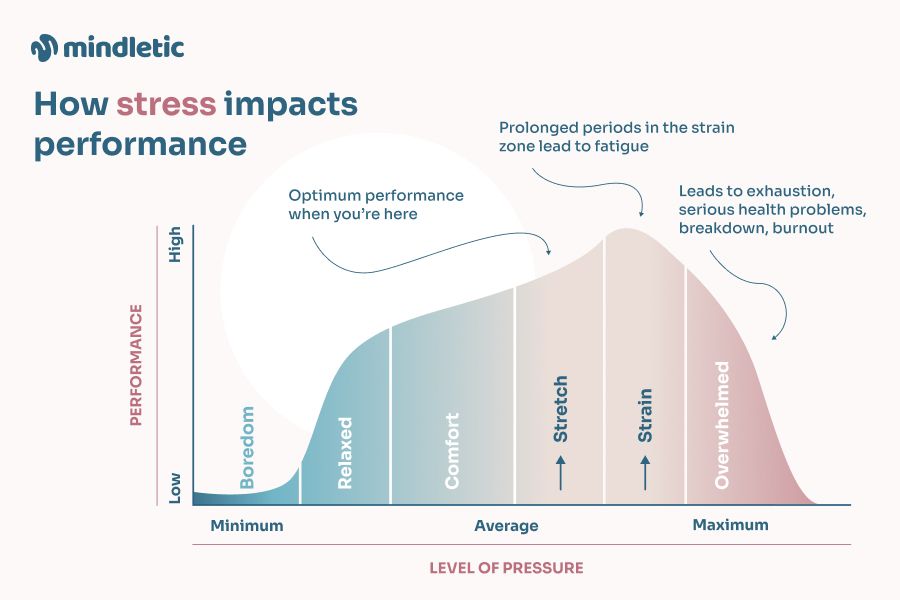While we may typically exhibit one stress response type, our responses can change depending on the day and the type of stress. For instance, work stress might trigger a flight response, while relationship stress could lead to a freeze. The key to handling stress effectively is knowing when it’s occurring and identifying its type at that particular moment. This increased self-awareness can help you learn to manage stress proactively.
What's my unique stress response type? The best ways to cope with stress

Each of us has a unique stress response. Popular coping strategies like yoga may work for some, but they might not suit everyone. Identifying your stress response type is key – it can help you manage tough periods, enhancing emotional resilience.
What is stress?
We often hear the term “stress” in our daily lives, so much so that sometimes we may even forget what it actually means. Simply put, stress is our body’s natural defense mechanism, preparing us for action.
This reaction results in heightened blood pressure, an increased heart rate, and muscle tension. Although these physiological reactions are consistent for many, the emotional response to stress can differ significantly among individuals.
Good vs. Bad stress
While we typically associate ‘stress’ with negative outcomes, it isn’t always harmful. There exists a type of ‘good stress’, otherwise known as ‘eustress’, that can actually increase engagement, enhance motivation, and lead to peak performance.
Think back to a time when you were in the flow zone, perhaps anxious about an upcoming deadline, yet excited about the process. That’s eustress in action.
With the right amount of pressure, our performance peaks, especially within the stretch/strain zones. This is the sweet spot where we feel a sense of accomplishment and progression.
However, excessive demands can push individuals into the strain/crisis zones. Here, performance starts to decline, feelings of anxiety rise, and we encounter the signs associated with ‘bad’ stress. Staying in these zones for extended periods leads to burnout.

Emotional response to stress
The emotional response to stress refers to the feelings evoked when a person is experiencing ‘bad stress,’ which is past the strain zone. These reactions can differ based on an individual’s personality, past experiences, emotional resilience, and coping mechanisms.
Which stress response type resonates with you?
🔥 Fight response
When under pressure, do you find yourself feeling irritable, agitated, or hyperactive? Individuals exhibiting the fight stress response often feel overwhelmed by an influx of energy, leading to restlessness and a feeling of being on edge.
You might find yourself jumping from one task to another, unable to concentrate on one thing for too long. You might also experience frantic energy that leads to impulsive decisions, racing thoughts, and a quickened heart rate.
If this sounds like you, you’ll benefit most from activities that calm you down, such as:
Listening to soothing music
Creating artwork or doodling
Practicing meditation or muscle relaxation techniques
Taking an easy walk in nature
For more tips, check out our guide on the visualization method for stress management.
🌧 Flight response
When you’re faced with stress, do you become numb, withdrawn, or zoned out? Do you struggle with productivity, or have difficulty starting tasks?
You may find yourself feeling detached from work or social activities, spending more time thinking than acting. It may feel as though you’re moving in slow motion, with every task seeming to require a lot of effort.
If this sounds like you, you’ll respond best to activities that are stimulating and energizing, such as:
Going for a jog
Taking cold showers
Playing lively music and dancing
Taking a brisk walk
If you struggle with procrastination, check out our guide on overcoming procrastination.
❄️ Freeze response
Do you freeze when under pressure? Do you feel stuck, or struggle to perform even the simplest tasks?
You may find yourself curled up in a ball, unable to move, as the deadline approaches. This inactivity, or lethargy, may last for prolonged periods of time and is characterized by a lack of mental energy required to perform.
If this sounds like you, you’ll respond best to activities that reboot your nervous system and reactivate your mind and body. You could start with deep breaths and mindful observations of your surroundings: what do you see and hear? It may also be helpful to move around, releasing muscle tension and reconnecting with your environment. The best exercises are those that engage both arms and legs, like:
Walking
Swimming
Dancing
Yoga.
You might also want to try grounding techniques, which can help reset your nervous system.
Final thoughts
Want to learn more about psychological safety at work and employee well-being? Reach out to our team and get a free consultation now.
Copyright © 2025 Mindletic | All rights reserved
